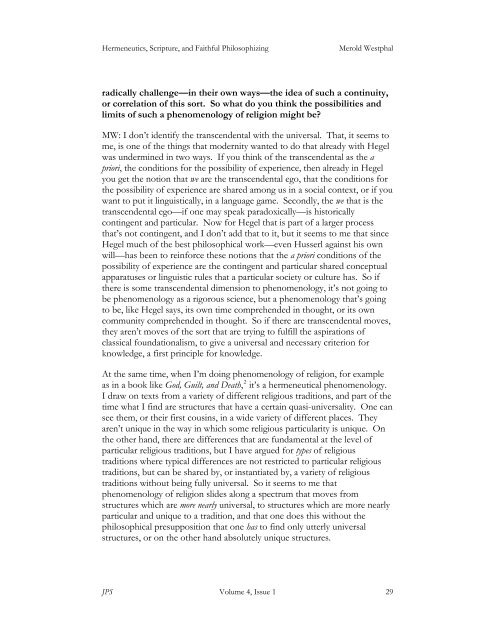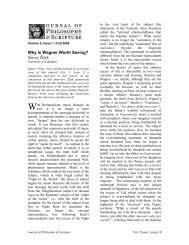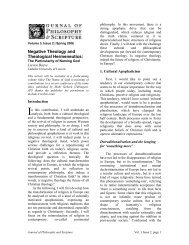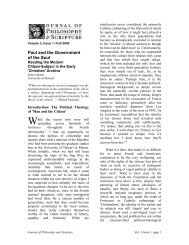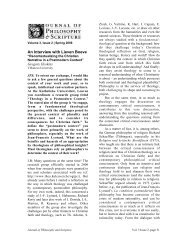interview with Merold Westphal - Journal of Philosophy and Scripture
interview with Merold Westphal - Journal of Philosophy and Scripture
interview with Merold Westphal - Journal of Philosophy and Scripture
You also want an ePaper? Increase the reach of your titles
YUMPU automatically turns print PDFs into web optimized ePapers that Google loves.
Hermeneutics, <strong>Scripture</strong>, <strong>and</strong> Faithful Philosophizing <strong>Merold</strong> <strong>Westphal</strong><br />
radically challenge—in their own ways—the idea <strong>of</strong> such a continuity,<br />
or correlation <strong>of</strong> this sort. So what do you think the possibilities <strong>and</strong><br />
limits <strong>of</strong> such a phenomenology <strong>of</strong> religion might be?<br />
MW: I don’t identify the transcendental <strong>with</strong> the universal. That, it seems to<br />
me, is one <strong>of</strong> the things that modernity wanted to do that already <strong>with</strong> Hegel<br />
was undermined in two ways. If you think <strong>of</strong> the transcendental as the a<br />
priori, the conditions for the possibility <strong>of</strong> experience, then already in Hegel<br />
you get the notion that we are the transcendental ego, that the conditions for<br />
the possibility <strong>of</strong> experience are shared among us in a social context, or if you<br />
want to put it linguistically, in a language game. Secondly, the we that is the<br />
transcendental ego—if one may speak paradoxically—is historically<br />
contingent <strong>and</strong> particular. Now for Hegel that is part <strong>of</strong> a larger process<br />
that’s not contingent, <strong>and</strong> I don’t add that to it, but it seems to me that since<br />
Hegel much <strong>of</strong> the best philosophical work—even Husserl against his own<br />
will—has been to reinforce these notions that the a priori conditions <strong>of</strong> the<br />
possibility <strong>of</strong> experience are the contingent <strong>and</strong> particular shared conceptual<br />
apparatuses or linguistic rules that a particular society or culture has. So if<br />
there is some transcendental dimension to phenomenology, it’s not going to<br />
be phenomenology as a rigorous science, but a phenomenology that’s going<br />
to be, like Hegel says, its own time comprehended in thought, or its own<br />
community comprehended in thought. So if there are transcendental moves,<br />
they aren’t moves <strong>of</strong> the sort that are trying to fulfill the aspirations <strong>of</strong><br />
classical foundationalism, to give a universal <strong>and</strong> necessary criterion for<br />
knowledge, a first principle for knowledge.<br />
At the same time, when I’m doing phenomenology <strong>of</strong> religion, for example<br />
as in a book like God, Guilt, <strong>and</strong> Death, 2 it’s a hermeneutical phenomenology.<br />
I draw on texts from a variety <strong>of</strong> different religious traditions, <strong>and</strong> part <strong>of</strong> the<br />
time what I find are structures that have a certain quasi-universality. One can<br />
see them, or their first cousins, in a wide variety <strong>of</strong> different places. They<br />
aren’t unique in the way in which some religious particularity is unique. On<br />
the other h<strong>and</strong>, there are differences that are fundamental at the level <strong>of</strong><br />
particular religious traditions, but I have argued for types <strong>of</strong> religious<br />
traditions where typical differences are not restricted to particular religious<br />
traditions, but can be shared by, or instantiated by, a variety <strong>of</strong> religious<br />
traditions <strong>with</strong>out being fully universal. So it seems to me that<br />
phenomenology <strong>of</strong> religion slides along a spectrum that moves from<br />
structures which are more nearly universal, to structures which are more nearly<br />
particular <strong>and</strong> unique to a tradition, <strong>and</strong> that one does this <strong>with</strong>out the<br />
philosophical presupposition that one has to find only utterly universal<br />
structures, or on the other h<strong>and</strong> absolutely unique structures.<br />
JPS Volume 4, Issue 1 29


